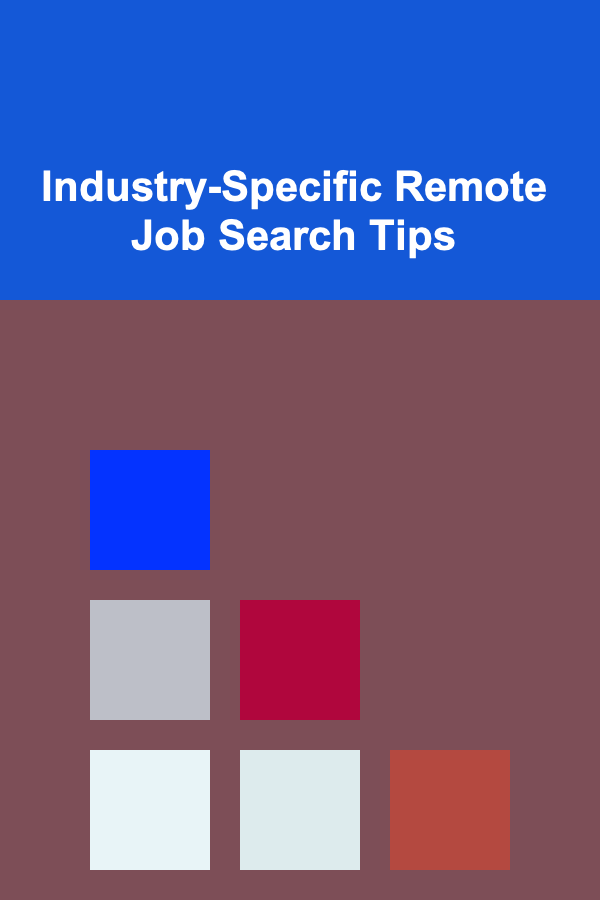
Industry-Specific Remote Job Search Tips
ebook include PDF & Audio bundle (Micro Guide)
$12.99$8.99
Limited Time Offer! Order within the next:

The demand for remote work has skyrocketed over the last few years, creating a wealth of opportunities across various industries. Whether you are looking to switch to a remote role, seeking flexibility, or exploring new career opportunities, the remote job market is full of possibilities. However, navigating this landscape can be tricky, especially since different industries have different demands, requirements, and hiring processes.
This guide will provide actionable tips tailored to specific industries to help you optimize your remote job search strategy. Whether you're in tech, marketing, customer service, healthcare, or other fields, this guide will offer insights on how to tailor your approach for each industry and increase your chances of landing a remote role.
Remote Job Search in the Tech Industry
The tech industry has been a leader in embracing remote work. From software development to cybersecurity, the flexibility to work from home is a major draw for many tech professionals. However, because of this high demand, competition can be fierce. Here's how to stand out in the tech remote job market:
Tailor Your Portfolio
In the tech industry, your portfolio is your resume. Recruiters want to see your skills in action, not just read about them. Whether you're a software developer, UX/UI designer, or data scientist, showcasing live projects can help you stand out.
- Create a personal website: Showcase your portfolio, projects, and achievements. Include open-source contributions, freelance work, or side projects.
- GitHub: For developers, GitHub is the gold standard for showcasing your coding skills. Make sure your repositories are clean, well-documented, and relevant to the roles you're applying for.
- Technical blog or articles: Share your knowledge through blog posts or technical articles. This demonstrates your expertise and thought leadership.
Focus on Remote-Friendly Technologies
Tech companies often prioritize specific technologies for remote work, so it's essential to align your skill set with what employers are looking for.
- Cloud platforms: Familiarity with cloud technologies like AWS, Google Cloud, and Azure is a huge plus.
- Collaboration tools: Understanding remote collaboration tools such as Slack, Jira, and Trello is critical for remote work in tech.
- Remote development environments: Knowledge of Docker, Kubernetes, or working with remote virtual machines can give you an edge.
Network within the Remote Tech Community
- Contribute to open-source projects: Open-source contributions are a great way to get noticed by tech companies. These projects not only build your reputation but also demonstrate your ability to collaborate with a remote team.
- Tech meetups and webinars: Attend virtual tech meetups or online conferences to meet industry professionals and learn about potential job opportunities.
- Social media presence: Platforms like Twitter and LinkedIn are valuable for tech professionals. Engage with thought leaders, share your work, and be active in online tech communities.
Remote Job Search in Marketing and Content Creation
Marketing and content creation roles are well-suited for remote work, as many aspects of these jobs, from strategy to execution, can be done online. However, standing out in these fields requires a unique approach.
Build a Strong Personal Brand
Marketing and content creation are about storytelling. If you want to work remotely in this field, your online presence must reflect your expertise.
- Showcase your work: Create an online portfolio or personal website where potential employers can easily access examples of your work.
- Create a blog or YouTube channel: Share your knowledge on trends, marketing strategies, or content creation tips. This not only shows your skills but also demonstrates your ability to generate engaging content.
- Engage on LinkedIn: Share marketing insights, case studies, and success stories on LinkedIn. Comment on posts, connect with peers, and use the platform to position yourself as an expert.
Specialized Remote Marketing Tools
Many marketing teams use specialized software for analytics, content management, and customer relationship management (CRM). Familiarizing yourself with these tools can make you more attractive to potential employers.
- Social media tools: Platforms like Hootsuite, Buffer, and Sprout Social for social media management.
- Email marketing tools: Experience with Mailchimp, HubSpot, or ActiveCampaign can be valuable for marketing positions.
- Analytics tools: Google Analytics, SEMrush, and Ahrefs are essential tools that you should be comfortable using.
Tailor Your Resume for Remote Marketing Roles
In your resume, highlight your experience with remote tools, your ability to work independently, and any remote collaboration tools you've used (e.g., Slack, Zoom, or Asana). Be sure to emphasize your results---employers want to know that you can drive traffic, increase engagement, or generate sales, even when working remotely.
Remote Job Search in Customer Service and Support
Customer service roles, particularly in industries like tech, e-commerce, and finance, are increasingly remote. The flexibility of handling customer queries from anywhere has become a major selling point for companies, but these positions also require specific skills and qualities.
Highlight Communication Skills
Communication is the core of customer service. In remote customer support roles, you need to be able to communicate clearly, professionally, and empathetically over various channels.
- Emphasize written communication: Many remote customer service roles require handling support tickets via email or chat. Ensure your resume highlights your writing abilities and your experience with customer support software.
- Demonstrate active listening: Show that you can handle customer concerns effectively by emphasizing your experience with conflict resolution and problem-solving.
Familiarize Yourself with Remote Support Tools
Working remotely in customer service means you will often rely on specific tools to manage customer relationships.
- Customer support software: Platforms like Zendesk, Freshdesk, and Intercom are commonly used in remote customer service roles.
- Live chat tools: Learn how to use live chat software such as Drift or LiveChat, which is often employed in real-time support.
- CRM software: Salesforce, HubSpot, or Zoho are key CRM tools that will be useful for managing customer interactions.
Tailor Your Application for Remote Support Roles
When applying for remote customer service roles, it's important to highlight any previous remote experience and demonstrate your ability to manage multiple tasks simultaneously. Employers will look for applicants who are organized, self-motivated, and comfortable with technology.
Remote Job Search in Healthcare
While healthcare is traditionally seen as a hands-on field, there are remote opportunities, especially in telemedicine, medical coding, healthcare administration, and case management. However, these positions often require specialized knowledge and certifications.
Highlight Relevant Certifications
Certifications are especially important in healthcare. Depending on the role, ensure that your resume reflects any relevant qualifications, such as:
- Telemedicine certifications: For telehealth roles, certifications such as the Telemedicine Certification offered by the American Telemedicine Association may be required.
- Medical coding and billing certifications: If you're pursuing medical billing or coding roles, certifications such as CPC (Certified Professional Coder) or CCS (Certified Coding Specialist) are essential.
- Nursing or clinical certifications: If you're looking for remote nursing or clinical roles, be sure to include your nursing license and any specialty certifications.
Focus on Remote-Ready Roles
Telemedicine is one of the fastest-growing areas of remote healthcare. Other roles like medical transcription, case management, and administrative positions can often be done remotely.
- Telemedicine platforms : Familiarize yourself with telemedicine software like Zoom for Healthcare, Doxy.me, or MDTech, which are commonly used in virtual care.
- EHR systems: Remote roles in healthcare often require experience with electronic health records (EHR) software like Epic, Cerner, or Allscripts.
Highlight Experience in Remote Environments
If you have previous experience working remotely, make sure to emphasize this in your resume. It's important for healthcare employers to know that you can maintain professionalism and confidentiality while working remotely.
Remote Job Search in Education
The education sector has seen significant growth in remote teaching and administrative positions. From online teaching to course development, there are a variety of remote opportunities, especially in K-12 and higher education.
Build Your Online Teaching Portfolio
If you're interested in teaching remotely, an online portfolio that highlights your teaching experience, credentials, and any digital teaching materials you've created will help you stand out.
- Create a demo lesson: If possible, create a short video or a sample lesson that showcases your teaching style. Many platforms that offer remote teaching positions may ask for one.
- Online education certifications: Familiarize yourself with certifications like TESOL, TEFL, or any subject-specific certifications that can boost your qualifications.
Leverage Online Education Platforms
- Teach on platforms like VIPKid or iTalki: These platforms allow educators to teach languages or other subjects remotely, and they often don't require a formal teaching degree, though a TESOL certification can be a bonus.
- Online tutoring : Platforms like Chegg, Tutor.com, or Wyzant offer opportunities for one-on-one tutoring that can be done remotely.
Showcase Digital Tools and Pedagogical Skills
Online educators must be proficient in digital tools like Google Classroom, Zoom, or Microsoft Teams. Highlight your ability to use these platforms effectively and your familiarity with virtual learning management systems (LMS).
Conclusion
Finding a remote job that fits your career goals requires a tailored strategy for each industry. By optimizing your resume, building a robust portfolio, staying informed about industry trends, and leveraging specialized tools, you can increase your chances of landing your ideal remote position. No matter the industry, the key to success is to continuously adapt and position yourself as an expert ready to contribute to the remote workforce.

How To Grow Your Small Business Organically
Read More
How to Stage a Bathroom for a Spa-Like Experience
Read More
How to Use a Zero-Based Budget to Control Every Dollar
Read More
How to Use Clear Containers for Small Items in Drawers
Read More
Mastering Digital Design: Essential Skills for Creating Engaging User Experiences
Read More
How To Simplify Your Fitness Routine
Read MoreOther Products

How To Grow Your Small Business Organically
Read More
How to Stage a Bathroom for a Spa-Like Experience
Read More
How to Use a Zero-Based Budget to Control Every Dollar
Read More
How to Use Clear Containers for Small Items in Drawers
Read More
Mastering Digital Design: Essential Skills for Creating Engaging User Experiences
Read More